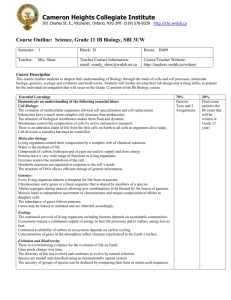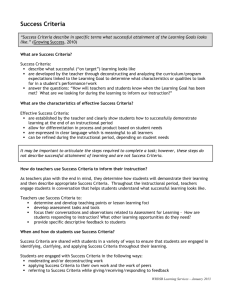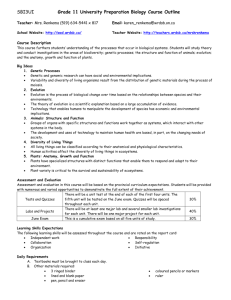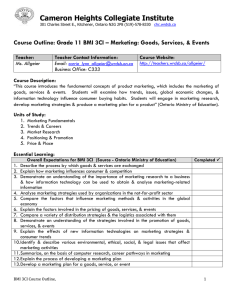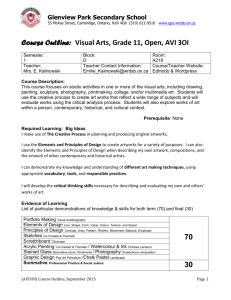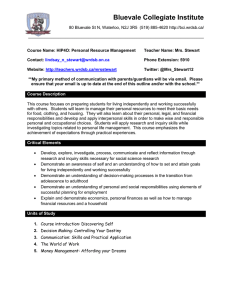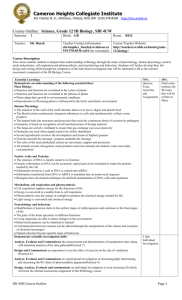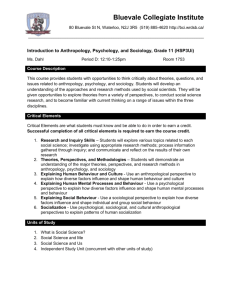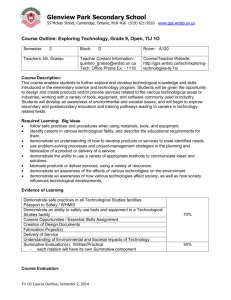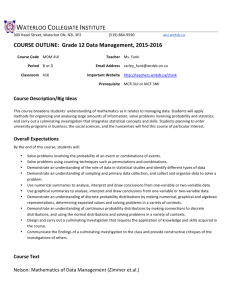CourseOutline
advertisement
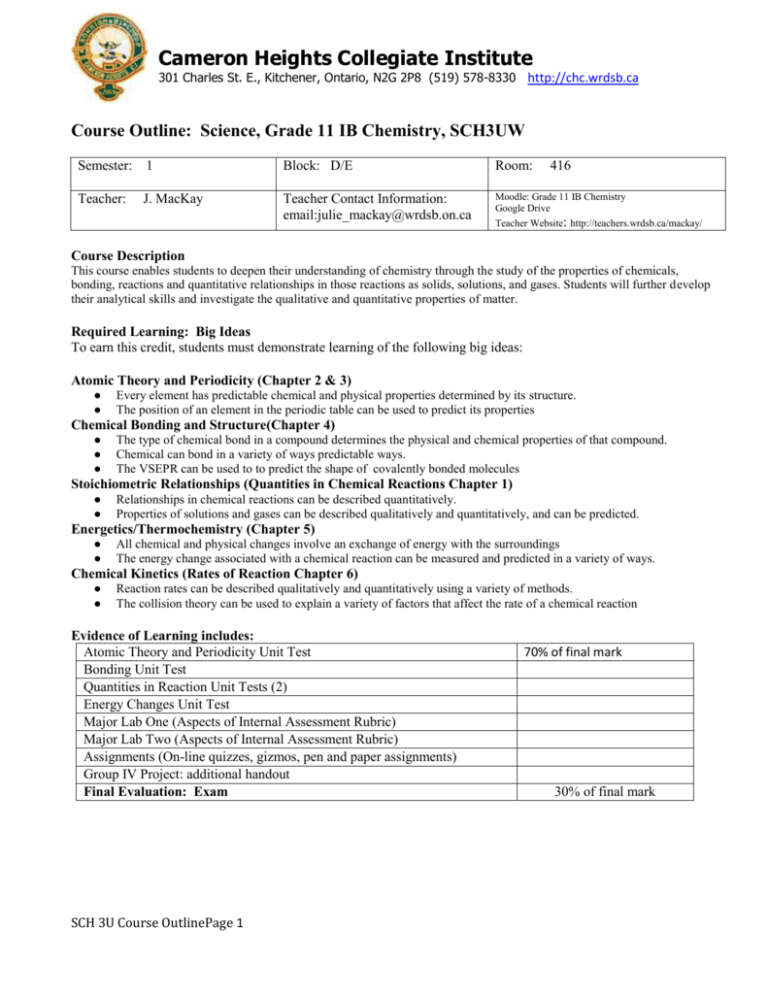
Cameron Heights Collegiate Institute 301 Charles St. E., Kitchener, Ontario, N2G 2P8 (519) 578-8330 http://chc.wrdsb.ca Course Outline: Science, Grade 11 IB Chemistry, SCH3UW Semester: 1 Block: D/E Room: Teacher: Teacher Contact Information: email:julie_mackay@wrdsb.on.ca Moodle: Grade 11 IB Chemistry Google Drive Teacher Website: http://teachers.wrdsb.ca/mackay/ J. MacKay 416 Course Description This course enables students to deepen their understanding of chemistry through the study of the properties of chemicals, bonding, reactions and quantitative relationships in those reactions as solids, solutions, and gases. Students will further develop their analytical skills and investigate the qualitative and quantitative properties of matter. Required Learning: Big Ideas To earn this credit, students must demonstrate learning of the following big ideas: Atomic Theory and Periodicity (Chapter 2 & 3) ● ● Every element has predictable chemical and physical properties determined by its structure. The position of an element in the periodic table can be used to predict its properties Chemical Bonding and Structure(Chapter 4) ● ● ● The type of chemical bond in a compound determines the physical and chemical properties of that compound. Chemical can bond in a variety of ways predictable ways. The VSEPR can be used to to predict the shape of covalently bonded molecules Stoichiometric Relationships (Quantities in Chemical Reactions Chapter 1) ● ● Relationships in chemical reactions can be described quantitatively. Properties of solutions and gases can be described qualitatively and quantitatively, and can be predicted. Energetics/Thermochemistry (Chapter 5) ● ● All chemical and physical changes involve an exchange of energy with the surroundings The energy change associated with a chemical reaction can be measured and predicted in a variety of ways. Chemical Kinetics (Rates of Reaction Chapter 6) ● ● Reaction rates can be described qualitatively and quantitatively using a variety of methods. The collision theory can be used to explain a variety of factors that affect the rate of a chemical reaction Evidence of Learning includes: Atomic Theory and Periodicity Unit Test Bonding Unit Test Quantities in Reaction Unit Tests (2) Energy Changes Unit Test Major Lab One (Aspects of Internal Assessment Rubric) Major Lab Two (Aspects of Internal Assessment Rubric) Assignments (On-line quizzes, gizmos, pen and paper assignments) Group IV Project: additional handout Final Evaluation: Exam SCH 3U Course OutlinePage 1 70% of final mark 30% of final mark Cameron Heights Collegiate Institute 301 Charles St. E., Kitchener, Ontario, N2G 2P8 (519) 578-8330 http://chc.wrdsb.ca Course Evaluation ● ● Throughout the course, teachers will gather evidence of student learning through observations, conversations, and studentproduced work. Seventy percent (70%) of the final mark will come from term work, and thirty percent (30%) will come from final evaluations. Report card grades will reflect the student’s most consistent level of achievement, with consideration given to more recent evidence. Learning Skills The Learning Skills and Work Habits section of the provincial report card is an integral part of a student’s learning. Students will be assessed in the following areas: ● Responsibility ● Independent Work ● Organization ● Initiative ● Collaboration ● Self-Regulation The following scoring system is used for Learning Skills: E=Excellent; G=Good; S=Satisfactory; N=Needs Improvement Course Materials In order to be successful it is important to be organized and prepared for each class. You will be expected to have the following items with you in class each day: ● Pens, pencils, ruler and calculator (cell phones and other electronic devices are not permitted) ● Binder with plenty of lined paper, dividers (to separate units) ● Standard Level Chemistry (text) and IB Data Booklet Sometimes internet access is required and although students have access to computers at the school, these resources are limited, so a laptop would be useful. Absences Absences must be validated and missed work completed outside of class time. If you miss a unit test or major lab for a valid reason, be prepared to complete it on the day you return. It is your responsibility to find out what you missed and catch up after being absent. If you know ahead of time about an absence make arrangements beforehand! Extra help is available– your teachers are pleased to assist you! The Science Office is Room F434; please make arrangements with your subject teacher or visit peer tutoring in room A202 if extra help is needed. For more information about the content of this course outline, please consult: ● Cameron Heights Collegiate Institute Moodle Website ● WRDSB’s Administrative Procedure 1660 (Assessment, Evaluation and Reporting) ● The appropriate CHCI teacher or administrator. Signatures Please share the information with your parents. Sign below indicating you have read and understood this course outline, including the requirements for successful completion of this course. Student Name & Signature SCH 3U Course OutlinePage 2 Parent/Guardian Name & Signature
